We hope you like it
As You Like It, directorial note by Damien Ryan

As You Like It opens with three words we might typically expect to preface a tall tale, a phrase as old as any hills anywhere, the sort of thing you’d hear by a campfire or from a grandparent spinning a web of nostalgia around a captive Christmas table…“As I remember”…
“As I remember…” — it’s how stories begin if we think about it. But Shakespeare’s trick in this play lies in his daring, joyous, subversive recognition that the act of storytelling really is fundamental to the task of being human. All the world’s a stage, he reminds us, and all of us are roleplaying every day in every way, from infancy to decrepitude, hoping against hope to control our own narrative. And yet — despite all the passionate effort, despite the commitment to ideals, the romantic adventures and unjust sufferings and random accidents and acts of selflessness (and acts of selfishness); despite the grand entrances and quiet exits, the donning of costumes, and buying of props and material things — that despite all this reaching and grasping, our fate is common and universal, and perhaps a little terrifying — “mere oblivion; sans teeth, sans eyes, sans taste, sans everything…”
This is a story that begs us to rail against that ‘oblivion’ while we can and it does so by celebrating stories! As You Like It is a hyper-theatrical montage of our most treasured kinds of story. As we seem to like it…Shakespeare gives it to us. He follows those fabled three words that open the play with a name, “Adam” — the ‘first man’ according to a very famous story, his name meaning “earth” — but he’s not that naked youth in a blooming garden anymore. He’s aged now, Eve is gone, and he’s still in an orchard but exhausted from a life of hard yakka, the penalty of tilling unforgiving land, his paradise bespoiled. The boy speaking with him is Orlando. His name, a default anagram of his father’s, Rowland, means ‘famed throughout the land, chivalric’ — in other words, he’s a story just waiting to happen, predestined to find adventure and it begins for him almost immediately. The first event of the play is two brothers trying to kill each other in this lost paradise, in the soil of that orchard — another story we know — Cain and Abel. Recognisable story motifs are building one upon another from page one and they grow exponentially from there. Archetypal tales, comings of age, underdog victories, families reconciled, prodigal sons, loves at first sight, evil step-parents, the oppressed finding freedom, oppressors finding loneliness, biblical tales, pastoral tales, far-fetched happenings, wild transformations, and weddings, lots of weddings, so many weddings that Shakespeare knows he is satirizing the very art of romantic comedy, laughing with us at what we love about stories

And by Act 5 the narrative has, deliberately, become almost plotless and so out of the control of its ‘players’, that the girl who thought she was in charge — Rosalind — will need a ‘magician’ and the faith of her companions to solve the labyrinthine mess she has made in the Forest of Arden. This ‘forest’ is repeatedly described by Shakespeare as a desert place, rough and unhospitable. He has it stand in for that fallen Eden — where Eve (this young girl, Rosalind) has so thoroughly tasted of the tree of knowledge that her extraordinary intellect (equal to Hamlet perhaps as Shakespeare's smartest character) cannot help but re-author Genesis from a woman’s perspective, teaching her future lover how to get beyond stereotypes, how to love deeply, how to listen to a woman, how to hold her as she changes shape, how to treasure mutual freedom of thought, of speech, of sexual agency. And how is this giant mess of hers solved in the end? By one of the ultimate ‘do nots’ of storytelling, literally ‘what not to do’ as a writer learning the craft — the use of a ‘deus ex machina’ — a ‘god from the machine’. Kids in early primary school are taught not to end stories by declaring ‘it was all just a dream’, and playwrights in the 1580s and 90s knew very well the equivalent dangers of the ‘deus ex machina’, a hackneyed ancient Greek contrivance of having a god-figure lowered into the space via a crane in the final moments to tie up a difficult story and explain the moral to the audience in case they missed it.
The practice was widely ridiculed in multiple documents and plays from the Savoy Scriptorum in London, an eleven-year-long writers’ workshop where many of the great playwrights of the period worked under the patronage and regal funding from 1580 to 1591. Shakespeare, in a glorious satire of all the things we love about storytelling, was deliberately mocking the elitism of contemporary writing by completing his tale with the arrival of such a god. He was daring the ridicule of his peers, provoking it, because this is a play that says, ‘stories are wonderful’ and when we lose that, we lose our childhood in the process. ‘As You Like It’! And he brings this god on stage to brilliant effect, and with deep, even profound, thematic understanding of his story and his purpose. The play hit the stage in 1599 in the brand new Globe Theatre in London, in the age of Elizabeth 1’s brutal theocratic rule, with an audience in the vice grip of a tightly controlled protestant theism defined by infallibility and monoband thought, so what sort of god does he bring on stage in a play about freedom of thought and healing? An androgynous, polytheist, genderless god — Hymen (the Greek god of marriage, Hymenaeus) — from an age when Gods were fallible and ubiquitous, one for every occasion, never agreeing with each other, as if recognizing that they were just mirrors of human behaviour and confusion, projections of our own futile attempts to understand the world — and so this almost mad play about gender-fluidity and sexual diversity will finally be blessed by an ancient non-binary god, its lovers and families reconciled and honoured as significant and worthwhile, regardless of social and traditional structures. It is daring and unexpectedly delightful
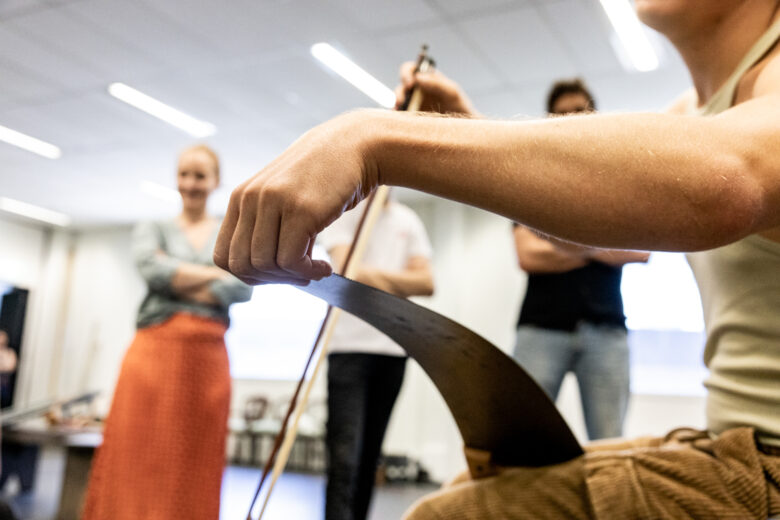
And so a new ‘ark’ filled with pairs of exiled lovers — chucked out or running away from the great flood of flattery, deceit, selfishness, disingenuousness, Machiavellian politics, violence and impositions on freedom of speech that characterized the civilized world and have since been striving to build a new community amidst the adversity of a “desert-place” — will sail back to the city to attempt to live better and learn from what went wrong when we fell from paradise in the first place. As You Like It is a comic fever dream from a playwright feasting on stories of all kinds and parodying our thirst for them. It takes theatre and acting seriously, but never too seriously, it wears its profundity lightly, eschewing iambic verse and poetry in place of the untidy freedom of prose — in fact it is more than 50% prose, a real rarity for plays of the period, especially plays about love. Prose is unstructured, informal, unromantic, and apparently formless — in other words, human. And it’s the play’s women who reject or challenge the artifice of poetry most fiercely. All four of the play’s women lash out at poetry as incapable of meeting the practical demands of living and particularly of loving. But why, what kind of playwright cannibalises his own art form? Can a romantic comedy exist without poetry, without love-verse? That’s the challenge Shakespeare sets himself — can we express love without poetry? — a giant play about desire, written in poetry, telling us that poetry can’t meet the inexpressible nature of desire — Shakespeare woos us with a poem that says a poem simply can’t woo us. Why?
Perhaps because practical things express love, not poetry — that’s what these women passionately tell us. Love doesn’t need rhyme, it needs turning up on time when you say you will, it means risking everything to save your brother, giving up your entire dynasty to help a friend escape from tyranny, leaving your workplace after 60 years of effort and giving over your life-savings so a boy can get a start in the world, helping a community see the good in adversity and struggle without descent into depression and despair. Love means commitment. Jane Austen elegantly screamed the same thing through her great protagonist Anne Elliot in Persuasion who recommends, “less Byron…and a larger allowance of prose in our daily study”. Poetry can be a beautiful and dangerous distraction when it comes to relationships. “The truest poetry is the most feigning”, says the wise fool, Touchstone, capturing the defining oxymoronic absurdism of it.
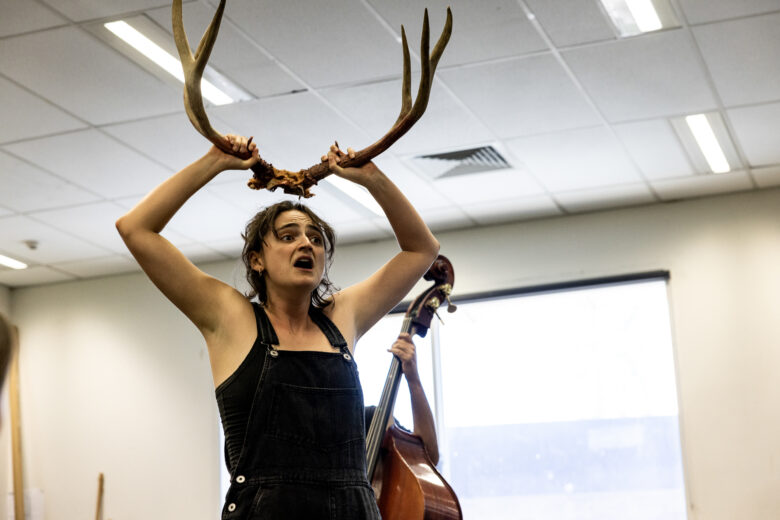
A Fool is very important to a community. Civilization corrupts and pollutes itself by nature and despotism is a short journey from democracy as the Greeks understood it. Tyranny and distrust breed fear which quickly feeds on individuality and Shakespeare frames such a place in the ‘Court’ in this play, a world of “painted pomp” and brutality where bloodsport is the pastime of the new ruler. As Arthur Miller wrote, “the sin of public terror is to divest people of conscience” — fear breeds impersonality, conformity, and impositions on freedom of speech, it builds homogeny. And it takes a fool like Touchstone to dare to fight against that conformity. In the forest, Jaques fulfils that same role, invectively cutting against what people too willingly accept as customary and inalterable. The transformation from the big smoke to this desert place is so often a therapeutic journey in stories — this Arden is a subconscious state of mind, it is something that happens to us. Place has the power to alter us, to reframe our perceptions — the tree-change, the natural life and its rhythms, slowing down, the time to think, a perspective that includes horizons, a capacity to regenerate and start again, a chance to metamorphose. Yet, in this sophisticated play, the country/rural idyll is no paradise, it’s a bitter Arcadia, a fearful, difficult place, cold and uninviting, food is scarce and Shakespeare places real dangers in this desert forest. If we are going to change, we’ll have to earn it. In some ways, ‘nature’, the ‘fool’ and the ‘intellectual’ Jaques, serve the same purpose, to remind human beings that we are just human beings and that flaws and failures are our destiny. Shakespeare assists that process in As You Like It through the shift from bitter winter to the promise of spring — hiems to ver — regrowth and renewal — supporting the play’s essential action — healing.
There are people all over the world going through all too real forms of exile right now who can uniquely understand what it is to lose everything that once defined you and have to rebuild your identity from within. And in our own way, the rest of us are a little more acutely aware of the feeling of having been exiled into our homes through a global pandemic, an enforced hermeticism, before finally returning to community. Did we take any time to learn anything about reframing a better world while we were locked away or is it back to business as usual?
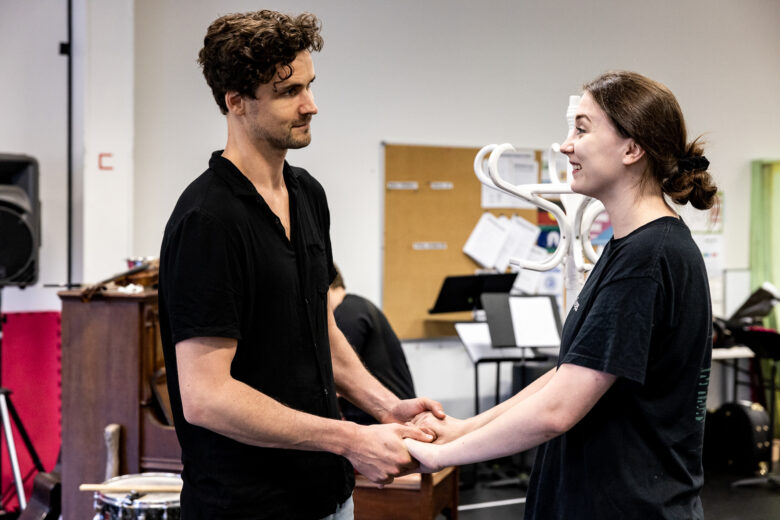
“It’s a sign of your own worth sometimes if you are hated by the right people”, wrote Miles Franklin through her heroine in My Brilliant Career in the late 19th Century, and it is her dazzling heroine we have modelled something of our Rosalind upon. This play says so much about freedom of expression and it is one of the hottest debates in our contemporary world. It’s significant that just as Rosalind can only find the freedom to truly express herself under the pseudonym Ganymede, Stella Maria Sarah Franklin felt she had to do the same under the name Miles. Ganymede is even more subversive of course, being common Elizabethan street slang for a gay man or boy. Rosalind — and Shakespeare — are bold-facedly introducing homoeroticism into this play the moment that names rings through the Globe Theatre and his whole audience knew it. This boy will go on to marry another boy, Orlando, in the forest, with both of them very conscious of the legality of their playful ‘handfast’ or marriage contract. The play was daringly subversive and counter-cultural in its time and remains so today.
Shakespeare loves to thread a visceral sensation through his plays, something buried deep in the language that operates on our senses, something we can taste, smell or see like polaroids in our imagination, something that will keep rearing up its head inside words, phrases, scenes, even at the most unexpected moments. Of course, As You Like It has one central and obvious tenet involving the human heart and we will come to that one…but his visceral sensation in this play is perhaps food!
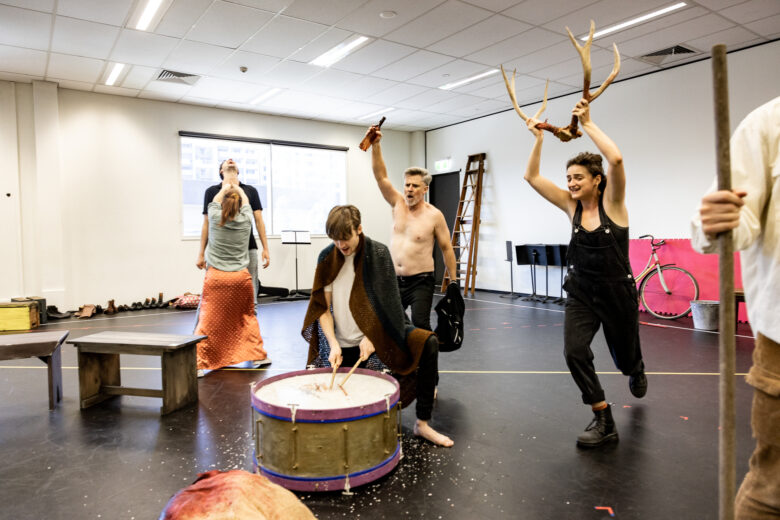
Food and feasting are a poetic staple of this play, sustained throughout — the ethics of food, the constant references to animalia right from the first speech, the shepherding of food, the hunting and killing of food, the consumption and critiquing of food, the sharing of it, the absence of it, the theft of food — we have an excess of it in the court and starvation and need in the forest. The play will argue endlessly about what it eats. And Shakespeare uses wrestling as part of that consumptive infatuation — who can be on top, who can get the higher ground, nothing is enough — it’s reflective of a Duchess who is unsatisfied, insatiable — what void is she filling, gormandising while men fight to the death in front of her? The play invites us to a recurring feast within its language, referencing food, diet, thirst, regurgitation, swallowing, digesting, killing for survival etc, again and again, even when the scene has nothing to do with eating or drinking. It is a pervasive referential world that brings our capacity/incapacity to satiate ourselves to every situation. He seems to be writing a play about a species that cannot fill and satisfy itself no matter how valiantly we try. And don’t we try!
The play feeds and starves us. Whether it be Orlando’s pain at not sharing his brother's table, “feeding with servants”, “eating husks” with his “hogs”, violently robbing a peaceful feast in the forest to prevent an old man from dying of thirst, or Touchstone’s outrage at the quality of “pancakes and mustard” at this court, or Oliver’s convincing a wrestler that he may die by ingesting “poison” or a snake entering a sleeping man’s mouth only to “slink away” and reveal a starving "lioness with udders all drawn dry” that seeks to devour the man whole, or Rosalind’s “bottomless” stomach for love (“like the Bay of Portugal”), or her desire for Celia to pour a “concealed man out of her mouth as wine comes out of a narrow-mouthed bottle”, only to put that “man in her belly”, says Celia. Or the great philosophical question that has broken the forest court apart — what right do we have to slaughter the animals in their native wild in order to sustain ourselves? Or Jaques’ name itself — pronounced Jake-wis — drawing from the nickname of a toilet in Elizabethan England — Jaques is a character with an irritable bowel full of melancholy, but one he has no intention of entirely purging. And these examples are not even to mention the forest feasts that frame the story.
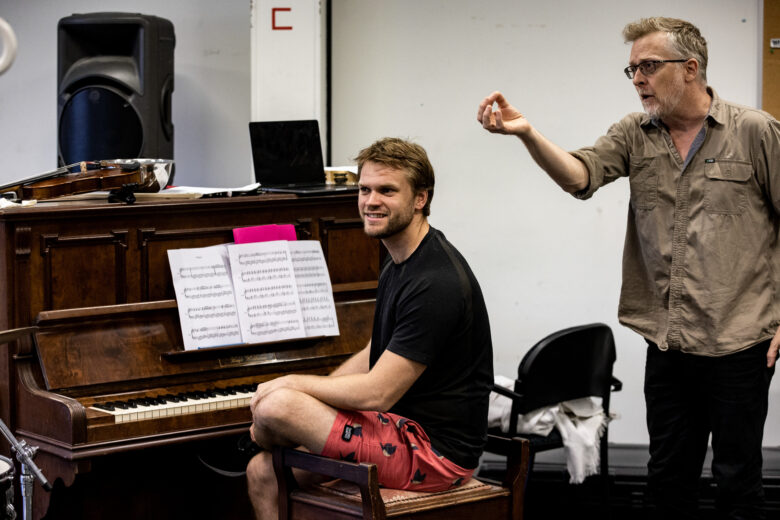
As Coco Chanel said, “I only drink Champagne on two occasions…when I am in love, and when I am not”. I feel like Shakespeare is saying something similar about the relationship between food, sex and desire in this great play from 1599. Life is spent trying to satisfy a thirst for something that is very hard to get and once got, not easy to digest or recover from.
And this Chanel quote ties us to that other central motif in the play…the ‘l’ word.
To distil As You Like It’s focus to its purest form is inevitably to talk of love. Love’s delightfully irrational force interrupts this play’s central thrust before it even has a valid reason to do so, when our depressed heroine Rosalind, simply looking for “sport” to make her merry, asks Celia, “what think you of falling in love?” She has no object of love yet and seemingly no likelihood of attaining one, but love in this play will find a way no matter what the disguise, barrier or probability.
And so a violent plot about bitter family disputes is hijacked from that moment by a tangle of love affairs, narrow escapes, adventures into the wilderness, infatuations, songs, celebrations and comic chaos so wonderfully untidy that when Hymen comes to clean up its exquisite mess, he/she/they offer in the process, irrefutable and highly optimistic proof that love is a very real, and deeply good, thing. And of course, as Rosalind says, “… merely a madness”
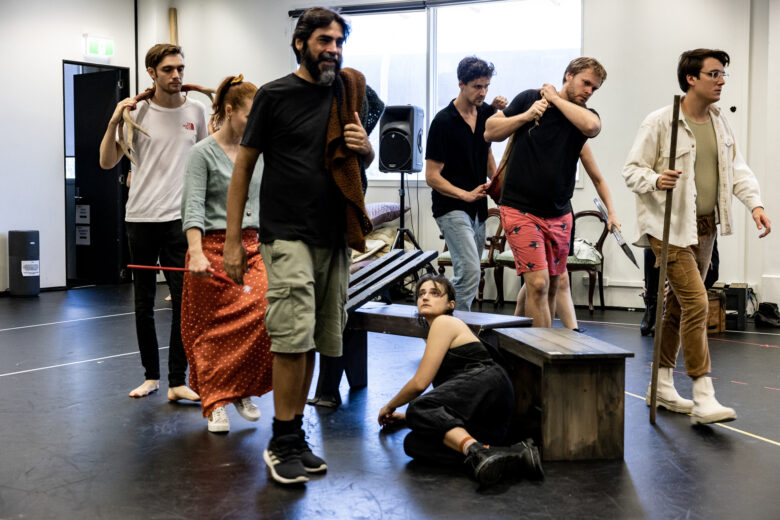
But Shakespeare’s vision of love is not at all generalized — it is all-encompassing, welcoming and very specific. This joyous comedy, at its heart, targets the many different forces and impulses within this thing we call ‘love’, exploring it both as a positive, curative force, and a disease from which we suffer. Each character’s story offers a unique prism through which to view the feeling — its vagaries, its agonies and waywardness, its transcendent joys, its “sighs and tears”, its “passion and purity”, its loyalty, its libidinal urges, its spontaneity, its risk and rewards, and above all, its optimism.
But how can anyone say anything ‘new’ about love? Shakespeare’s solution is to mock what has been said before, and his characters do this mercilessly in As You Like It. The play may end with ‘perfect’ love, but it is parodied and ridiculed on its way there. For Jaques, a love song is inevitably a “woeful ballad made to his mistress eyebrow”. Orlando’s heartfelt rhymes are dismissed as “tedious homilies of love” and turned into filthy jokes by a fool, and the protestations of his willingness to “die” for love are met with Rosalind’s frank and passionately realist response that “men have died from time to time, and worms have eaten them, but not for love”. That and many other conventional balloons of love are viciously burst in this almost anti-romantic rom-com.
The play and its heroine strive to teach us of a love that goes beyond pretence, convention and superficiality, and she is relentless, even excessive in doing so, she’s not a typical heroine. She does not disparage love or passion – why would she, she is ‘in’ it herself – but she wants Orlando, Phoebe, Silvius, Touchstone and anyone else willing to listen, to recognise that our idealised, mythologised visions of love are unrealistic and misleading, built upon ancient misogynist traditions that need challenging. For her, heroes like Leander did not die for love but “being taken with a cramp…drown’d”. It is the false artifice of love she wants to cure in us, replacing it with the reality of what it will be like to live with love — “for every passion something, and for no passion, truly anything”.
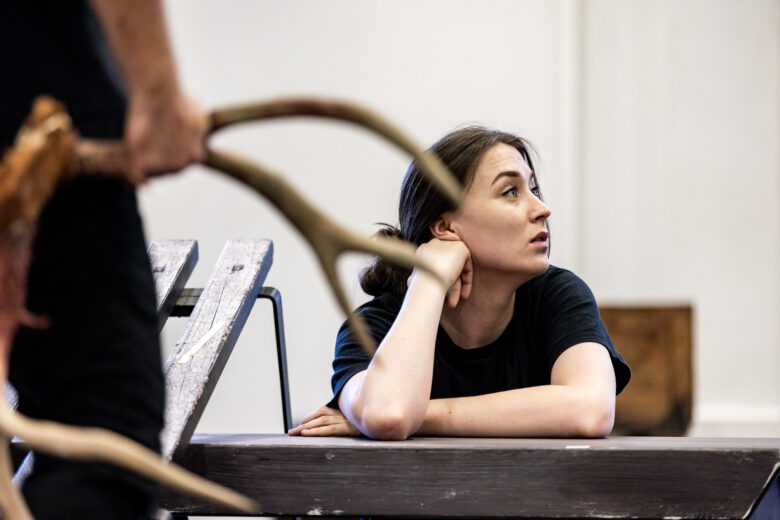
Shakespeare does not attempt to sever sex from love in this play either. Rosalind’s desire for Orlando is as physical as it is emotional, “come, woo me, woo me, for now I am in a holiday humour and like enough to consent.” Her boyish disguise is liberating her spirit and her sexuality in a spectrum that crosses between hetero and homoeroticism freely.
In the end, the play seems to ask us to believe in the profound truth of love, as a delight, a surprise, a choice and a responsibility. It gives us romantic ‘true’ love, poetic conventional love, unrequited love, exploitative lust, same-sex love, ‘sisterly’ love, the painful journey to brotherly love, and not least, the unconditional love of an old man for his young master. In the process, it gives us a series of roles that actors simply love to play and this, along with the absolutely extraordinary original music score from local singer/songwriter/actor Alec Steedman, has been the greatest joy for us in the rehearsal room. Alec and the cast have done an incredible job to keep all of the music in the show live amidst its already challenging and very musical language.
It has frankly been a joy to be in a rehearsal room with these wonderful generous artists and theatremakers, on stage and behind it. This play is about people coming together in a desert forest to argue about what matters in life, and it has provoked wonderful, transformative and challenging conversations for us every day in our attempts to play it.
Thank you for coming. We hope…you like it.
Damien